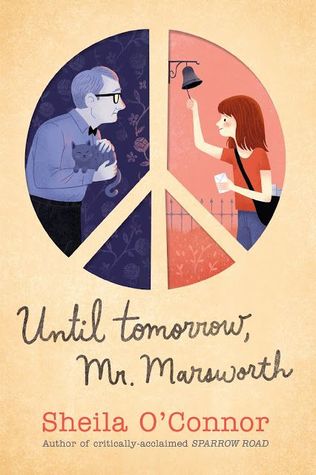 O'Connor, Sheila. Until Tomorrow, Mr. Marsworth
O'Connor, Sheila. Until Tomorrow, Mr. MarsworthApril 3rd 2018 by G.P. Putnam's Sons Books for Young Readers
Purchased copy
Reenie, her father, and her brothers Billy and Dare move from Missouri to live with their grandmother in Minnesota in 1968 because their mother's cancer treatments bankrupted the family. Reenie and her brothers all have jobs, and they are saving up to pay for Billy's college tuition at the University of Missouri so that he can be deferred from the draft. It's unusual for a girl to have a paper route, even with her brother, so local thugs Rat and Cutler give her a hard time, but she gives as good as she gets, which only escalates their feud. One of Reenie's customers is Mr. Marsworth, but he will not answer his bell. Reenie starts leaving him lengthy letters, and he returns brief, typewritten letters in response. He encourages Reenie to go to the library, make friends with another new girl on the street, and eventually, to go to the beach near the lake house he owns to give her something to do. She still persists in writing, especially when she finds out that Mr. Marsworth was a conscientious objector during WWI, and she will try anything to keep Billy from going to Vietnam. With the encouragement of her new pen pal, Reenie has her brother write a letter to the newspaper, visit a center to help him with his application, and apply to a Quaker college Mr. Marsworth attended. As the summer wears on, Billy's situation becomes more pressing, the family must make plans for the future, and secrets from the past are revealed.
Strengths: This is an interesting topic, and one which I am very happy to see represented in literature. Aside from Kurlansky's Battle Fatigue, and Qualey's Hometown (M.E. Kerr's Slap Your Sides is WWII) I can't think of another book that does. There are lots of good descriptions of every day life in 1968, and the letter format makes sense within the context. I liked that the plight of the conscientious objector in several other conflicts was addressed. The family secret caught me by surprise, but made sense and was resolved in an interesting way.
Weaknesses: There is a lot going on in this book, which dilutes the central message. I could have done without the mother's death or the bullying from the local thugs, and Reenie would have done well to learn from Mr. Marsworth's brevity. Her "handwriting" was somewhat wearing to read.
What I really think: This will be a popular choice for the 1960s unit our seventh grade does, and will get checked out a bit more frequently than other titles about this time period because of the appealing cover.

























No comments:
Post a Comment